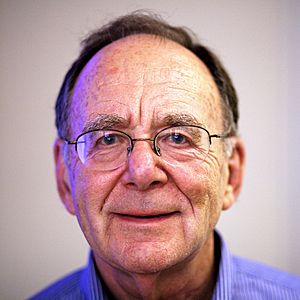Richard M. Karp facts for kids
Quick facts for kids
Richard Manning Karp
|
|
|---|---|

Richard Karp at the EPFL in 2009
|
|
| Born | January 3, 1935 |
| Education | Harvard University (BA, MA, PhD) |
| Known for | Aanderaa–Karp–Rosenberg conjecture Edmonds–Karp algorithm Held–Karp algorithm Hopcroft–Karp algorithm Karmarkar–Karp algorithm Rabin–Karp string search algorithm Karp–Lipton theorem Karp's 21 NP-complete problems Vector addition system |
| Awards | Fulkerson Prize (1979) Turing Award (1985) John von Neumann Theory Prize (1990) IEEE Computer Society Charles Babbage Award (1995) National Medal of Science (1996) Harvey Prize (1998) EATCS award (2000) Benjamin Franklin Medal (2004) Kyoto Prize (2008) |
| Scientific career | |
| Fields | Mathematics Computer science |
| Institutions | University of California, Berkeley IBM |
| Thesis | Some applications of logical syntax to digital computer programming (1959) |
| Doctoral advisor | Anthony Oettinger |
| Doctoral students |
|
Richard Manning Karp, born on January 3, 1935, is a famous American computer scientist. He works at the University of California, Berkeley. He is well-known for his important work on the theory of algorithms. For his discoveries, he received the Turing Award in 1985. He also won The Benjamin Franklin Medal in 2004 and the Kyoto Prize in 2008.
Karp was chosen to be a member of the National Academy of Engineering in 1992. This was for his big contributions to understanding "NP-completeness." He also created smart ways to solve problems and used probability in computer science.
Biography
Richard Karp was born in Boston, Massachusetts. He has three younger brothers and sisters: Robert, David, and Carolyn. He grew up in a small apartment in Boston.
His parents both went to Harvard University. His father wanted to be a doctor but became a math teacher instead. Richard Karp also went to Harvard University. He earned his bachelor's degree in 1955. He then got his master's degree in 1956. In 1959, he finished his Ph.D. in applied mathematics. After that, he started working at IBM's Thomas J. Watson Research Center.
In 1968, he became a professor at the University of California, Berkeley. He taught computer science, mathematics, and operations research. Karp was the first person to lead the Computer Science Division there. He has mostly stayed at Berkeley, except for four years when he taught at the University of Washington. Since 1999, he has also been a research scientist at the International Computer Science Institute in Berkeley. He currently leads the Algorithms Group there.
Richard Karp has received many awards. These include the National Medal of Science and the Harvey Prize. He also got the 2004 Benjamin Franklin Medal. These awards recognized his deep understanding of how complex computer problems are. In 1994, he became a Fellow of the Association for Computing Machinery. He is also a member of several important groups, like the U.S. National Academy of Sciences.
In 2012, Karp became the first director of the Simons Institute for the Theory of Computing. This institute is also at the University of California, Berkeley.
His Work and Discoveries
Karp has made many important discoveries in computer science. He also contributed to finding the best solutions and operations research. Today, he is very interested in bioinformatics, which uses computers to study biology.
Key Algorithms and Theories
- In 1962, he worked with Michael Held to create the Held–Karp algorithm. This algorithm helps solve the travelling salesman problem. It finds the shortest route for a salesman visiting many cities.
- In 1971, he and Jack Edmonds developed the Edmonds–Karp algorithm. This algorithm helps solve the maximum flow problem in networks. Imagine finding the most water that can flow through a system of pipes.
- In 1972, he published a very important paper. In it, he showed that 21 different problems are "NP-complete." This means they are very hard for computers to solve quickly.
- In 1973, he and John Hopcroft created the Hopcroft–Karp algorithm. This is the fastest way to find "matchings" in bipartite graphs. Think of matching students to projects.
- In 1980, with Richard J. Lipton, Karp proved the Karp–Lipton theorem. This theorem helps us understand how hard certain problems are for computers.
- In 1987, he worked with Michael O. Rabin to create the Rabin–Karp string search algorithm. This algorithm helps computers quickly find a specific word or phrase within a longer text.
The Turing Award
Richard Karp received the Turing Award in 1985. This award is like the Nobel Prize for computer science. His award was given for:
- His ongoing work on the theory of algorithms. This includes creating efficient ways to solve problems in networks.
- Helping us understand that problems that can be solved quickly by computers are "efficient."
- Most importantly, his work on "NP-completeness." Karp showed a standard way to prove if a problem is NP-complete. This helped scientists find many problems that are very difficult for computers to solve.
See also
 In Spanish: Richard Karp para niños
In Spanish: Richard Karp para niños
 | Emma Amos |
 | Edward Mitchell Bannister |
 | Larry D. Alexander |
 | Ernie Barnes |

